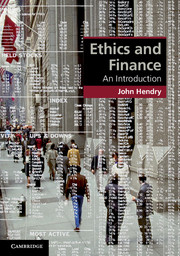Book contents
- Frontmatter
- Contents
- Preface
- Acknowledgements
- 1 Opening case study: the financial crisis
- 2 Introduction
- 3 Ethical foundations
- 4 The financial system
- 5 Lending and borrowing: where finance meets ordinary people
- 6 Trading and speculation: the ethics of financial markets
- 7 Agency and accountability: managing other people’s money
- 8 Products, promotion and client relationships
- 9 Financial reporting and corporate governance
- 10 Epilogue: the ethics of financial regulation
- Glossary
- References
- Index
10 - Epilogue: the ethics of financial regulation
Published online by Cambridge University Press: 05 June 2014
- Frontmatter
- Contents
- Preface
- Acknowledgements
- 1 Opening case study: the financial crisis
- 2 Introduction
- 3 Ethical foundations
- 4 The financial system
- 5 Lending and borrowing: where finance meets ordinary people
- 6 Trading and speculation: the ethics of financial markets
- 7 Agency and accountability: managing other people’s money
- 8 Products, promotion and client relationships
- 9 Financial reporting and corporate governance
- 10 Epilogue: the ethics of financial regulation
- Glossary
- References
- Index
Summary
Throughout this book, the financial regulators have emerged as key players. Sometimes we only find out that something is wrong when the regulators act. Often they act in response to public concerns, but it is only when they act that we get enough information to work out what went wrong. Sometimes things seem to go wrong because – or partly because – the regulators fail to act, act too slowly or too softly. One of the conclusions suggested by our discussion of the financial system was that utility might be significantly enhanced by a more effective system of global regulation. Many of the specific ethical problems we have discussed appear to have arisen either from deregulation (e.g., of the banking system and the capital requirements and other constraints under which it operates) or in areas that are effectively unregulated (derivatives trading, ratings agencies, hedge funds, parts of the mortgage industry, etc.), but look like they probably should be regulated.
From the amoral perspective of the financial sector, regulation is no more a moral issue than anything else to do with finance. In line with public choice economics, financial theorists and financial practitioners alike tend to see the regulators as self-interested actors seeking to maximize their own utility. They are part of the economic competition, on this view, not arbiters of it, and while the rules of the game give them certain rights, in particular the right to impose fines or even, in extremis, to ban players from the game, they don’t give them any moral authority or any particular moral responsibility.
- Type
- Chapter
- Information
- Ethics and FinanceAn Introduction, pp. 265 - 281Publisher: Cambridge University PressPrint publication year: 2013

